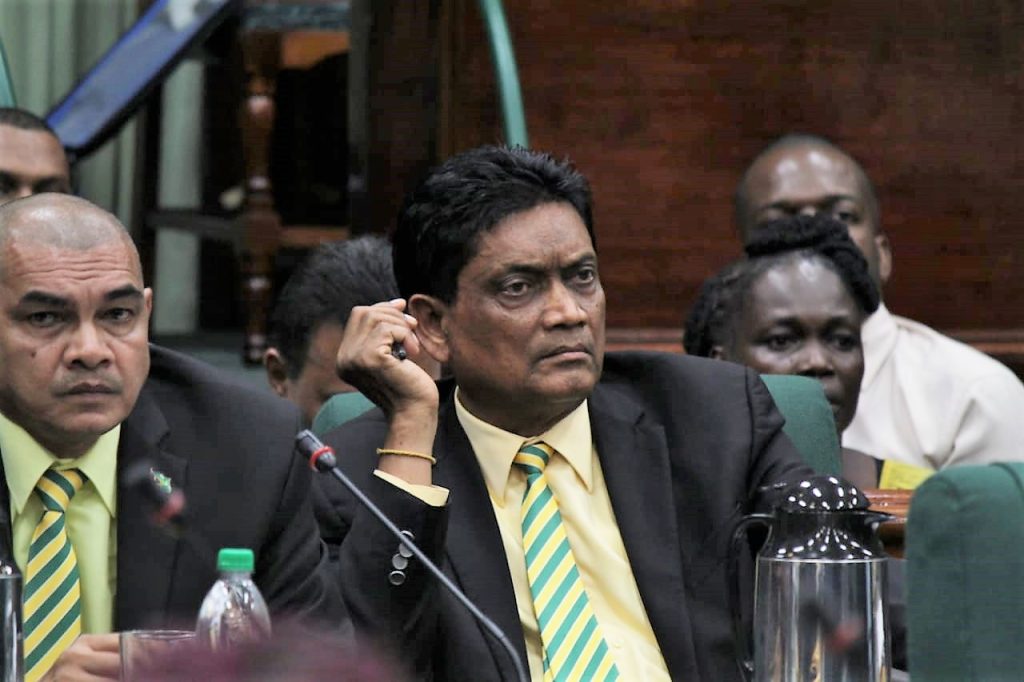Charrandass Persaud, the man who voted against his own Government and caused its collapse on December 21, is attending today’s sitting of the Caribbean Court of Justice (CCJ), which is hearing from all parties on what consequential orders should be made after it ruled that the No Confidence motion was properly passed.
It is the first time that Persaud has returned to the Caribbean after he fled to Canada hours after he voted to remove the Coalition government from power. He was labelled a Judas, someone who betrayed his Government, and a usurper.
Chief Justice (ag) Roxanne George-Wiltshire, who made the first ruling on the legal challenge to the motion, had said she did not consider that Mr Persaud was a usurper, especially since the only reason the challenge to his membership of the National Assembly was filed was because of his No Confidence vote.
The arguments had sought to nullify the single vote of Mr Persaud; the Government wanted his votes on all other matters, including to pass budgets and so on, to remain in place.
“… a party cannot be complicit in the perpetuation of an illegality and cry foul when things go wrong,” the Chief Justice had stated in the original ruling on the case.
With the CCJ ruling, which has upheld the passage of the No Confidence vote, Persaud said it is what he wanted.
“I stood there as a proud Guyanese,” he told the News Room last Friday.
The Caribbean Court of Justice last Tuesday morning ruled that the December 21 No Confidence Motion was properly passed with a vote of 33 members in the 65-seat National Assembly.
Accordingly, the Court ruled that the provisions of Article 106 of the Constitution were triggered, namely that elections be called in three months unless a two-thirds majority of the House.

Article 106 (6) states: “The Cabinet including the President shall resign if the Government is defeated by the vote of a majority of all the elected members of the National Assembly on a vote of confidence.”
Reid had contended that Charrandass Persaud had violated Articles 155(1)(a) and 156(3) of the Constitution of Guyana in that he, on the date of the no-confidence motion, was a dual citizen of Canada and Guyana and because he voted against the list he was elected to represent his vote was invalid and the No Confidence motion would thereby not have been carried.
The Court found that indeed, Charrandass Persaud was not qualified to sit in the National Assembly because he was a dual citizen.
This dual-citizenship meant that he was not qualified to sit in the National Assembly because Article 155 of the Constitution provides as follows: “No person shall be qualified for election as a Member of the National Assembly who is, by virtue of his own act, under any acknowledgement of allegiance, obedience or adherence to a foreign power or state.”
But even so, the procedure and time for challenging his election had long past – in fact, years had passed.
Article 163 of the Constitution, in conjunction with the National Assembly (Validity of Elections) Act, Chapter 1:04, sets out the method and time frame for approaching the High Court to challenge the eligibility of an elected MP.
The eligibility of an elected member is only permissible by way of election petition within twenty-eight (28) days of the official declaration of the results of the election, pursuant to Article 163(4) and Sections 3 and 5 Sub-section (1) of Chapter 1:04 and Rule 3 of the National Assembly (Validity of Elections) Rules as appended to that Act.
In cases where a Parliament is found to have been unlawfully elected, the Constitution makes no provision to invalidate or quash the Parliamentarian’s vote. All it does is provide a penalty in Article 58 of $50 per day for anyone who continues to sit in the National Assembly while disqualified.
In any case, if a Member is deemed to be illegal, his vote still counts because of what Article 165(2) of the Constitution says: “The Assembly may act notwithstanding any vacancy in its membership (including any vacancy not filled when the Assembly first meets after the commencement of this Constitution or after any dissolution of Parliament) and the presence or participation of any person not entitled to be present at or to participate in the proceedings of the Assembly shall not invalidate those proceedings.”
President of the CCJ Justice Adrian Saunders stated: “Fealty to one’s party cannot override sworn allegiance to the Constitution and to the people of Guyana. Members of Parliament, should they so decide, and as long as they are willing to pay the political price, are not to be denied the freedom to vote according to the dictates of their conscience even in a proportional representation system.






